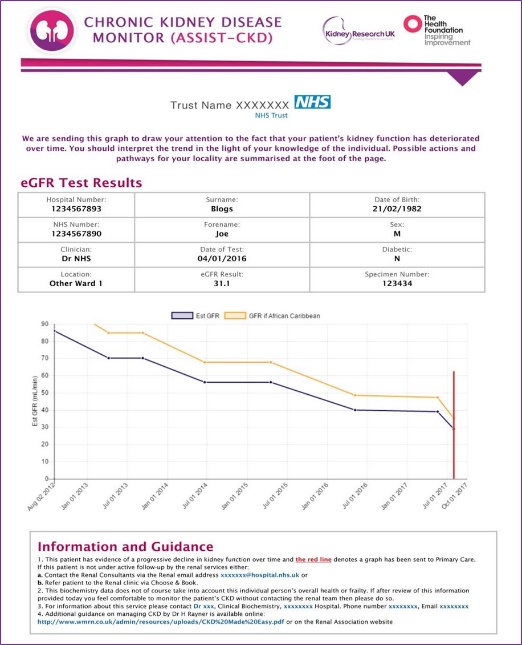
ASSIST-CKD is a quality improvement project led by Kidney Research UK, which aims to provide better and safer patient care by identifying people with chronic kidney disease (CKD) who are at the greatest risk of disease progression. By helping ensure people are referred to secondary care at the right time, for the right treatment in the right care setting, this will potentially reduce the rate of decline and so delay or even avoid the need for dialysis or transplant.
It is a UK-wide project, which commenced in 2015, supported by the Health Foundation, involving over 20 renal units and pathology laboratories, and their surrounding GP practices covering an estimated population of around 11-12 million people.
ASSIST-CKD uses software to map data from routine blood tests (eGFR), creating graphs of kidney function over time. For people with deteriorating kidney function, the participating laboratory send a report, including the graph, to the referring GP with a prompt that specialist advice may be needed. Another benefit is that patients with more stable CKD can be discharged back into primary care confident that their kidney function will continue to be monitored via these graphs.

Dr Darren Powell, Consultant Clinical Biochemist in Merseyside, at one of the participating sites, says:
ASSIST-CKD is ‘doing the right thing’ and allows me to screen for and escalate to clinicians a serious preventable but hidden condition in way not possible using any other currently available clinical software. Knowing that this has a direct effect in avoiding preventable renal failure and a debilitating reliance on dialysis or transplant, makes me proud to be involved.
A patient representative adds:
If the ASSIST-CKD project can prevent even a small number of people from developing kidney failure then it will be worth every penny spent and every man hour worked on it.
Results to date:
The primary endpoint which will be evaluated by the UK Renal Registry for each site and will be available in Autumn 2020, is the percentage of referrals to secondary care less than 90 days from commencement of renal replacement therapy. In the meantime three sites are conducting in-depth local evaluations to provide additional information. The qualitative evaluation has already showed the intervention might impact on other outcomes including:
- improved awareness of kidney disease in primary care
- understanding of GPs as to the importance of eGFR progression over time
- improved management of medicines that affect kidney function and
- involvement of patients in understanding their condition (where patients have been shown the graph).
Sustainability and ownership:
There is already evidence of genuine local ownership of the intervention:
- some sites have developed their own models for reporting
- a number of sites have contributed to updated versions of the eGFR graphing software
- one site has developed its own software, based on the ASSIST-CKD model, but with an entirely different IT architecture which uses electronic systems for communicating with local GPs
- sites have produced their own peer-reviewed publications and conference abstracts describing their local experiences.
Many sites have continued to implement the ASSIST-CKD intervention beyond the initial year’s funding from the Health Foundation. 12 sites have been implementing ASSIST-CKD for more than one year (this number may rise further as several sites only commenced reporting in 2018). Of the 12 sites:
- eGFR reporting has been fully embedded (no additional funding sought) in seven sites
- additional local funding has been found (or the Project Award spread over more than one year) in four sites
- only one site has stopped reporting
- eight sites have been running for more than two years
- two sites have been reporting for more than three years.
Aims for future research:
- one of the laboratories involved is exploring whether machine learning can replicate human interpretation of disease progression
- the project team is also trying to establish whether dynamic changes in eGFR can predict the need for and timing of RRT. This would aid timely referral to renal services more than one year from expected time of ESRD, giving time for dialysis/transplant preparation or conservative management
- the team are also hoping to evaluate how people with CKD might perceive the graph, if the graph was shared with them during a consultation.


